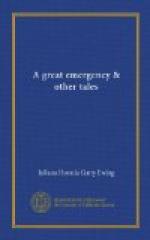“I’m so hungry,” he moaned.
I was hungry myself, and decided to order some supper, so when the woman came up and civilly asked if she could do anything for us before we went to bed, I said, “If you please we’re rather hungry, but we can’t afford anything very expensive. Do you think you can get us anything—rather cheap—for supper?”
“A red herring?” she suggested.
“What price are they?” I felt bound to inquire.
“Mrs. Jones has them beautiful and mild at two for a penny. You can get ’em at three a penny, but you wouldn’t like ’em, sir.”
I felt convinced by the expression of her face that I should not, so I ordered two.
“And a penny loaf?” suggested our landlady, getting her bonnet from behind the door.
“If you please.”
“And a bunch of radishes and a pint of fourpenny would be fivepence-half-penny the lot, sir.”
“If you please. And, if you please, that will do,” said I, drawing a shilling from the bag, for the thought of the herrings made me ravenous, and I wanted her to go. She returned quickly with the bread, and herrings. The “fourpenny” proved to be beer. She gave me sixpence-half-penny in change, which puzzled my calculations.
“You said fourpenny,” said I, indicating the beer.
“Yes, sir, but it’s a pint,” was the reply; and it was only when in after-years I learned that beer at fourpence a quart is known to some people as “fourpenny” that I got that part of the reckoning of the canvas bag straight in my own mind.
The room had an unwholesome smell about it, which the odour from our fried herrings soon pleasantly overpowered. The bread was good, and the beer did us no harm. Fred picked up his spirits again; when Mr. Rowe’s old mate came home he found us very cheerful and chatty. Fred asked him about the son who was at sea, but I had some more important questions to put, and I managed so to do, and with a sufficiently careless air.
“I suppose there are lots of ships at London?” said I.
“In the Docks, sir, plenty,” said our host.
“And where are the Docks?” I inquired. “Are they far from you?”
“Well, you see, sir, there’s a many docks.
There’s the East India
Docks, St. Katharine’s Docks, and the Commercial
Docks, and Victoria
Dock, and lots more.”
I pondered. Ships in the East India Dock probably
went only to India.
St. Katharine conveyed nothing to my mind. I
did not fancy Commercial
Docks. I felt a loyal inclination towards the
Victoria Dock.
“How do people get from here to Victoria Dock now, if they want to?” I asked.
“Well, of course, sir, you can go down the river, or part that way and then by rail from Fenchurch Street.”
“Where is Fenchurch Street, Mr. Smith?” said I, becoming a good deal ashamed of my pertinacity.
“In the city, sir,” said Mr. Smith.




